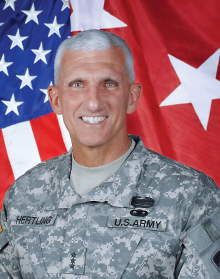Health care can be a complicated business, but that doesn’t mean that being an effective health care leader needs to be complicated too, believes retired Lt. Gen. Mark Hertling. And most of the several hundred doctors, nurses, and administrators who’ve taken part in Hertling’s leadership development program at Florida Hospital in Orlando would likely agree.
At APA’s IPS: The Mental Health Services Conference, being held in New Orleans from October 19 to 22, attendees will get an opportunity to learn about Hertling—who many might recognize from his role as a military and national security analyst on CNN—and his innovative leadership training course based on military models when he delivers the meeting’s keynote address.
“People probably think the military is all about ordering people around, but nothing could be further from the truth,” he said. “The success of the military is based around team building and engendering trust.”
The techniques that underlie this philosophy are simple, focusing on good communication and ways to develop character, presence, and empathy. But, during his 37 years of service in the U.S. Army, including a tour as commanding general of U.S. Army Europe and Seventh Army, Hertling found them to be effective time and again.
Hertling admits, however, that he wasn’t always confident that the military approach to leadership would translate to a field like medicine—and it wasn’t why he was initially brought to Florida Hospital.
“I was hired to head a global partnership initiative, but I had an office next door to the chief medical officer,” he said. “He came in a few times for some advice about handling a problem with one of the doctors. ‘How would you fix this in military?’ he asked.”
Eventually, perhaps impressed with the results of Hertling’s suggestions, the chief medical officer asked for more details on the military approach and wondered if Hertling could set something up for Florida Hospital.
“I was unsure about the proposition,” he said. In doing some preliminary research, however, he realized that almost every existing leadership book or strategy—of which there were many—was needlessly overwrought and confusing. Perhaps a direct, no-nonsense method was exactly what was needed. So he agreed to put together a course, with his only demand being that it would be interdisciplinary and welcome all hospital staff.
Hertling developed an eight-part seminar series that took a stepped approach to instilling leadership skills: people first learn to look inward and lead themselves, then how to lead other individuals, how to lead a boss, how to lead teams, and finally, how to lead an organization.
“It was about halfway through that first course when we saw there was definitely something to this model,” he told Psychiatric News. “You could start to see changes in the attitudes and communication skills.”
Today, Hertling’s course is about to start its fifth year, with over 350 graduates who have contributed to a significant change in culture at Florida Hospital. The success has added a new title to Hertling’s portfolio, as he now oversees all leadership education at the hospital. In this capacity, Hertling has started a new course for executive leadership. In keeping with the interdisciplinary theme, the new course includes both hospital executives and physicians who have taken Hertling’s other leadership program.
He has also completed a book about his philosophy, Growing Physician Leaders: Empowering Doctors to Improve Our Healthcare, and gone on the road to spread this program to other places. While he was once unsure of the potential of the military model, it has now been successfully implemented for veterinarians, business leaders, and even political appointees.
He hopes that those who listen to his presentation at IPS will find value in this leadership approach as well.
“Not only can it improve communication with peers or administrators, but given the nature of psychiatric consults, mental health professionals might find it improves their own techniques in dealing with patients,” he said. ■

